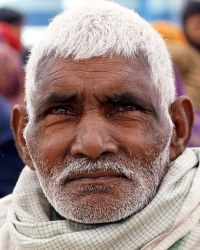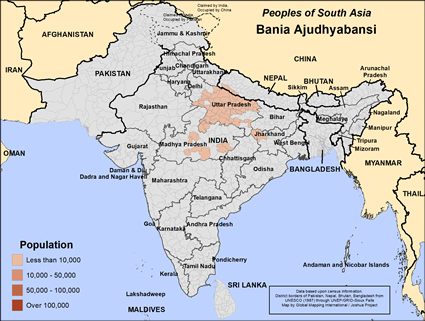Bania Ajudhyabansi in India

Photo Source:
Copyrighted © 2026
Isudas All rights reserved. Used with permission |

Map Source:
People Group data: Omid. Map geography: UNESCO / GMI. Map Design: Joshua Project.
|
| People Name: | Bania Ajudhyabansi |
| Country: | India |
| 10/40 Window: | Yes |
| Population: | 99,000 |
| World Population: | 99,000 |
| Primary Language: | Hindi |
| Primary Religion: | Hinduism |
| Christian Adherents: | 0.00 % |
| Evangelicals: | 0.00 % |
| Scripture: | Complete Bible |
| Ministry Resources: | Yes |
| Jesus Film: | Yes |
| Audio Recordings: | Yes |
| People Cluster: | South Asia Forward Caste - Bania |
| Affinity Bloc: | South Asian Peoples |
| Progress Level: |
|
Introduction
The Ajudhyabansi Bania are a subgroup of the Bania, who originated over 5,000 years ago. Their name means ‘trader' in Sanskrit. This caste has always worked in trade, business, and money lending. Despite their high incomes, the Ajudhyabansi Bania have only a modest status in the Hindu caste pyramid. Resenting the higher two castes, they have often been leaders in caste reform movements. Mahatma Gandhi was a Bania. They claim the Hindu religion, but as the wealthiest in India and perhaps in the world, they appear to worship the god of wealth, good fortune and money.
Ministry Obstacles
The gospel has not made inroads into any Bania subgroup. Any work among them will be in the beginning stage. Pride in material wealth will not be easy to overcome in this people group.
Outreach Ideas
Pray for the Followers of Christ
Pray for the Entire People Group
Pray that the Ajudhyabansi Banias will see that the only true wealth are the spiritual riches gained through a loving relationship with Jesus Christ.
Pray that Christ's disciples will be called to work among them and share Christ in a culturally relevant way.
Pray for a movement to Christ to emerge among every Bania community, including the Ajudhyabansi.
It will take people from other business communities to reach the Ajudhyabansi Bania on a peer-to-peer basis. Pray for the Lord to raise up such people.